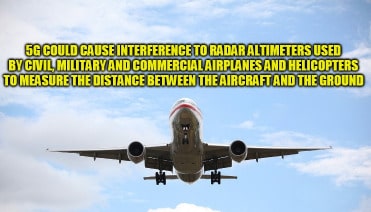Airline Industry Asks for Delay Around 5G Retrofit
UPDATE Major U.S. airlines working on retrofitting radio altimeters due to potential interference from 5G C-band wireless services are now asking for an extension, reported Reuters. According to a statement made by the aviation industry on Tuesday, airlines cannot fully meet deadlines to complete upgrades and urged Washington for a grace period through the end of 2023.
Several airlines and their manufacturers, including American, Boeing, Airbus, Embraer, aviation unions, and others, signed a letter backing the FAA’s extension request. According to the letter sent to the White House, global supply chain issues mean “air carriers will likely be unable to fully meet either the December 2022 deadlines for smaller regional aircraft and many large transports or the July 2023 retrofit deadline.”
Reuters reported that the letter noted since January, “the FAA has documented over 100 FAA incidents of potential 5G interference … Unfortunately, the U.S. government agencies do not appear to be on the same page with respect to these safety issues.” The letter continued, “inter-agency government progress appears to be at a stalemate while stakeholders are doing their part to address these issues.” Inside Towers reported earlier this fall that FAA acting Administrator Billy Nolen said the agency wants the FCC to mandate voluntary mitigations both AT&T and Verizon agreed to earlier in 2022, to include 19 smaller telecoms and other spectrum holders.
Of course, 5G interference issues are not isolated to aviation equipment. In 2020, utility companies and associations filed lawsuits against the FCC for not protecting utility infrastructure from potential electrical interference issues with 5G (see 1, 2). Telecom provider, SpaceX has stated that Dish’s 5G satellites will cause interference issues affecting Starlink satellite service. DirecTV and RS Submit have also warned about satellite interference issues. The Department of Defense (DoD) has also been trying to resolve potential 5G network interference issues with military radar. In August, a bi-partisan group of senators requested that the FCC reconsider harmful interference risks with associated Ligado’s network before allowing it to be activated. Fortunately in September, Ligado cancelled trial network plans, perhaps because of a report that also warned about interference. Then last month, another report revealed that the telecom industry was aware of “known RF challenges” with 5G as well!
Let’s not forget – the FCC has also granted “conditional approval” for testing 6GHz Wi-Fi despite dangerous interference issues with it as well.
But I digress –in regard to 5G, since 2017 doctors and scientists have been asking for moratoriums on Earth and in space due to biological and environmental health risks (see 1, 2, 3, 4). Since 2018 there have been reports of people and animals experiencing symptoms and illnesses after it was activated (see 1, 2. 3, 4, 5). In 2019, telecom executives gave congressional testimony that they had NO independent scientific evidence that 5G is safe and the majority of scientists worldwide oppose deployment. Some researchers have also warned that activation may be contributing to COVID-19 infections as well as hundreds of thousands if not millions of bird deaths. Of course, research has also revealed biological and environmental harm caused by exposure to 4G and other sources of wireless Wi-Fi radiation and electromagnetic fields (aka “Electrosmog”). Nevertheless, the FCC (see 1, 2, 3, 4, 5, 6, 7, 8) – the regulatory agency which lost a lawsuit for NOT updating wireless radiation guidelines (including 5G) since 1996 – and other American government and state agencies and committees (see 1, 2, 3, 4, 5, 6, 7) have continued to promote and fund 5G deployment and densification (see 1, 2) as well as that of 4G and public Wi-Fi (which also poses known health and environmental risks). American businesses – including restaurant chain Panda Express – have committed to expanding 5G deployment and activation too!
Other widely reported issues associated with 5G include poor service (see 1, 2, 3, 4, 5, 6, 7, 8, 9) and cybersecurity risks (see 1, 2). This is what’s best for Americans?!
Article: FAA has documented 100+ incidents of potential 5G aviation interference
